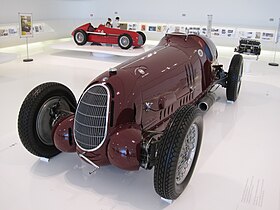
Back Alfa Romeo 12C-36 Tipo C German Alfa Romeo 12C Spanish آلفا رومئو ۱۲سی Persian Alfa Romeo 12C-36 French Alfa Romeo 12C Italian Alfa Romeo 12C Russian Alfa Romeo 12C Slovenian Alfa Romeo Tipo C Swedish Alfa Romeo 12C TLY Alfa Romeo 12C Ukrainian
| Alfa Romeo 12C | |
|---|---|
 An Alfa Romeo 12C-36 | |
| Overview | |
| Manufacturer | Alfa Romeo |
| Production | 1936-1937 |
| Designer | Vittorio Jano |
| Body and chassis | |
| Class | Grand Prix 750 kg |
| Layout | FR layout |
| Powertrain | |
| Engine | Roots supercharged 4.1 L 4064 cc 60° V12 370 bhp at 5800 rpm (12C-36)[1] Roots supercharged 4.5 L 4475 cc 60° V12 430 bhp at 5800 rpm (12C-37) |
| Transmission | 4-speed manual transmission |
| Dimensions | |
| Curb weight | 818 kg (1804 lb) (12C-36) 808 kg (1782 lb) (12C-37) |
| Chronology | |
| Predecessor | Alfa Romeo 8C-35 |
| Successor | Alfa Romeo Tipo 308 Alfa Romeo Tipo 312 Alfa Romeo Tipo 316 |
The Alfa Romeo 12C or Tipo C was a 12-cylinder Grand Prix car. The 12C-36 made its debut in Tripoli Grand Prix 1936, and the 12C-37 in Coppa Acerbo 1937. The 12C-36 was a Tipo C fitted with the new V12 instead of the 3.8 litre straight-eight of the 8C-35. The 12C-37 was a new car, with a lower chassis and an engine bored and stroked to 4475 cc, now with roller- instead of plain bearings and two smaller superchargers instead of a single large one. The car suffered poor handling, which could not be cured in time for the 1937 Italian GP, and thus was not successful. This is given as the reason for Vittorio Jano's resignation from Alfa Romeo at the end of 1937.[2] The 12C-36 used the existing six Tipo C chassis. Four examples of the 12C-37 were built, although only two were actually assembled for the 1937 Coppa Acerbo and Italian GP. Early in 1938, the Tipo C (8C-35, 12C-36) chassis were modified into 308s, with the straight-eight engine fitted lower in the chassis and a completely new body. The four 12C-37 chassis were instead assembled into 312 (V12 downsized to 3-litre) and 316 (V16 obtained from two 158 engines fitted to a common crankcase) formula race cars.
- ^ Borgeson, Griffith (1990). The Alfa Romeo Tradition. ISBN 0-85429-875-4.
- ^ "CARS (PART 1) ALFA ROMEO". kolumbus.fi/leif.snellman. Archived from the original on 19 April 2007. Retrieved 2007-04-26.